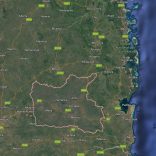Hollard Mozambique announces winners of Hollard Better Future Awards
The People – Mozambique is home to a variety of groups, who speak around 60 different languages and dialects belonging to the Bantu family. These are Makua, Thonga, Shona/Ndau, Sena, Nyungwe and Yao.

Mozambique is home to a variety of groups, who speak around 60 different languages and dialects belonging to the Bantu family. These are Makua, Thonga, Shona/Ndau, Sena, Nyungwe and Yao.
By the end of 2012, Mozambique’s population is estimated at just over 23,700,715 million inhabitants, according to National Statistics Institute (INE), 7,385,294 inhabitants are in the cities and the remaining 16,315,421 inhabitants are in rural areas.
Men will be 11,426,321 people against 12,274,394 women.
The main cities are Maputo (1,178.116 inhabitants), Matola (671,556), Beira (431,583) and Nampula (388,526), according to the 2007 census.
According to the National Institute of Statistics, in 2011 the number of Mozambican population was 23,049,621 inhabitant, and by 2019 the estimated number will be 28,571,310 inhabitants.
Religion
Christian (Catholic and Protestant), Muslim and Hindu and traditional beliefs. In the days of Eid (Islamic religion) and Easter (Christian religion), the Government decrees a public holiday.
Languages
Portuguese is the official language of the country, however, there are more than 60 languages spoken throughout the country. English is spoken in major cities as business language.
Public Holidays
- 1 January – New Year
- 03 February – Mozambican Heroes Day
- 07 April – Mozambican Woman Day
- 01 May – Labour Day
- 25 June – Independence Day
- 07 September – Lusaka Agreement Day
- 25 September – Armed Forces Day
- 25 December – Family Day/Christmas
Government
The Politics of Mozambique occurs within a presidential representative democratic republic, whereby the President of Mozambique is the head of state and head of government of a multi-party system. Executive power is exercised by the Government. Legislative power is vested in both the government is the Parliament.











Leave a Reply
Be the First to Comment!
You must be logged in to post a comment.
You must be logged in to post a comment.